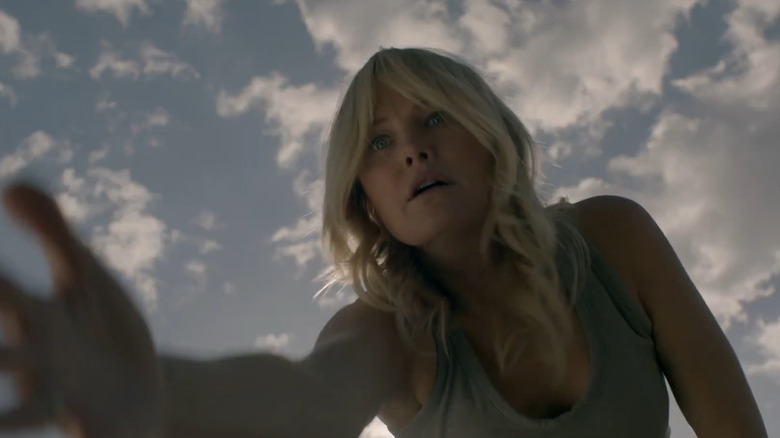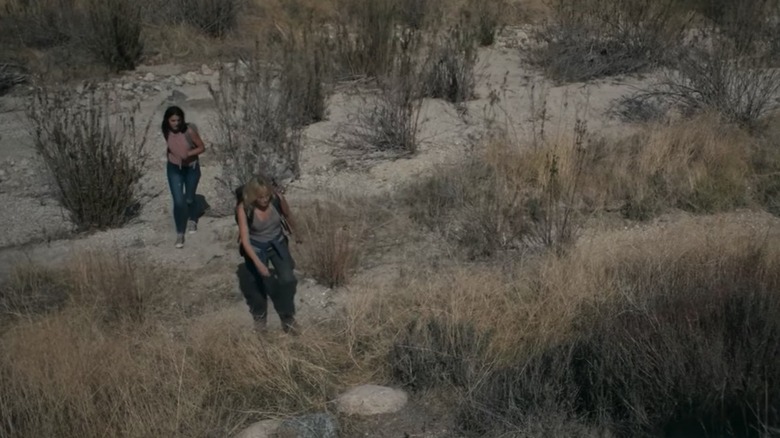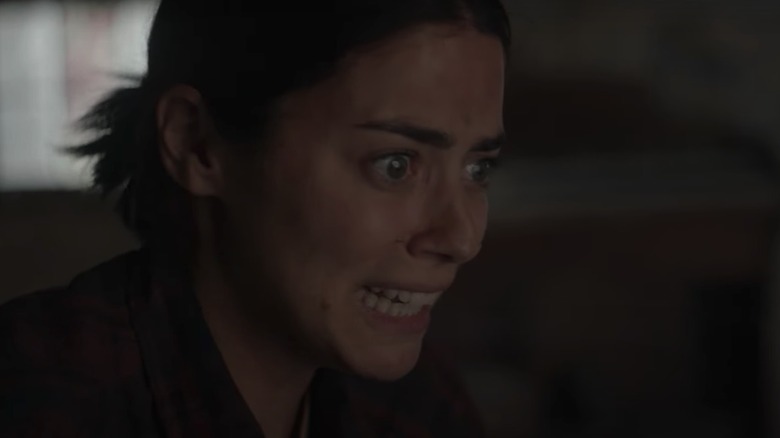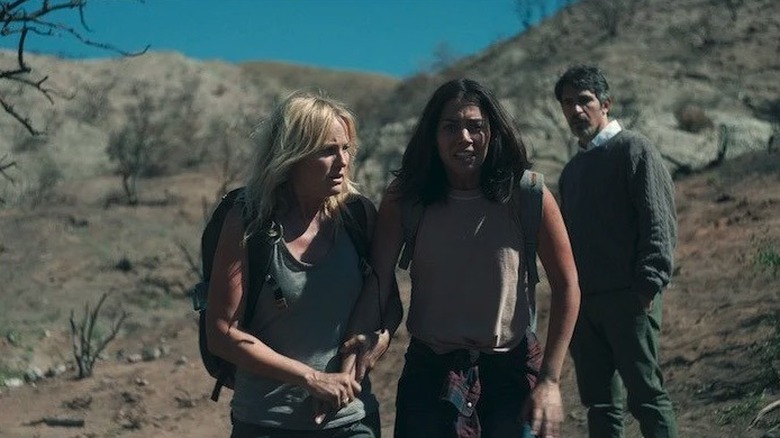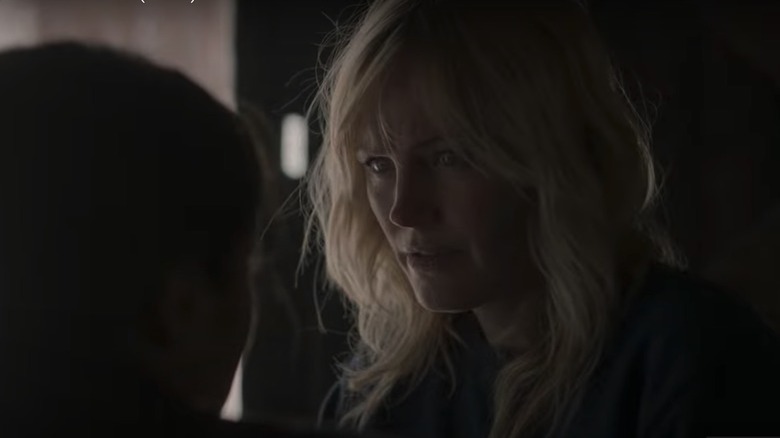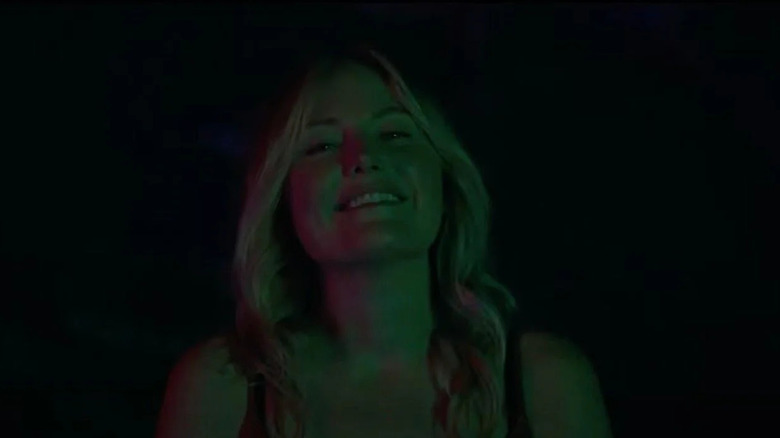The Aviary Writer/Directors On Cults, Influencers, And Why Chris Messina Works As A Cult Leader [Interview]
"The Aviary" hits theaters, digital, and on demand on April 29, 2022. The thriller stars Malin Akerman, Lorenza Izzo, and Chris Messina, and follows two women who flee into the New Mexican desert to escape a sinister cult. It's a low-budget cult thriller that features a fantastic turn from Akerman, and a particularly chilling performance from Messina.
I got a chance to chat with writer/directors Chris Cullari and Jennifer Raite about the film, where the idea came from, what cults inspired it, and how even jobs can feel like cults sometimes.
'We hadn't really seen any cult thrillers that started at the end.'
I loved the movie, and I loved how you leave a lot of things mysterious. So where did the idea for this come from?
Chris Cullari: The idea came from a couple different places. Jen and I have long been interested in cults and nature's belief and a lot of the work done just as writers has dabbled in that. And we were looking for something that ... we knew we wanted to do something that played in a cult world, but tackled a little bit more the idea of influencers versus followers, because we live very much in an influencer and follower world. And the idea of how you can quickly find yourself enthralled to somebody, to the point where you're not quite sure where your feelings about something begin and theirs end, or vice versa. And so, it was a combination of just having a lot of conversations about those ideas. And then one day, the opening of the movie kind of popped into our heads of these two women running through the desert and looking back, it's some sort of compound in the distance. One of them keeps going and the other one looks just a little too long. And when we had that, we were like, "Oh, what are they up to? That's really interesting." And we kind of combined it with the ideas we've been discussing and "The Aviary" was born.
You know, it's interesting. One of the things that really stood out to me is that you guys started this after they already left. So it's interesting that you say that. Was there ever a moment where — because I really liked that — was there ever a moment you thought, "Should we show more of the actual compound?"
Jennifer Raite: We were curious about it. We talked about it. We even, just for ourselves, we talked about it with our production designer. Like, "What would it look like?" We showed references to the actors even, but we really liked the idea of starting the movie with them leaving because it felt like in so many more traditional escape the cult movies, them getting out is the end. And because we wanted to focus so much on the emotional and psychological piece of the escape and start with this feeling of, "Yay, we're out. We did it," and have that really unravel as, "Oh no, we didn't." It just felt right.
Cullari: And it felt like a new space to play in too, because outside of" Martha Marcy May Marlene," we hadn't really seen any cult thrillers that started at the end. "Faults," Riley Sterns' first movie, "Faults" is a little bit of that, of deprogramming, but it just felt like a richer space in terms of telling a story that hadn't really been told before. And it gave us a ... when the body is free, but the mind isn't was, for our characters, I think the most interesting place to start the movie.
'They both knocked it out of the park.'
I like what you said before about influencer versus influenced. And it's interesting in a way that it kind of weaves back and forth. And I really like that. Did you know when you were writing this, who you wanted to cast?
Raite: A little bit. So when we were doing our last real rewrite before we went out to actors, we had started talking with our producers, Jessica Rhoades and Andrew Miller, about who is our dream Jillian, who could this be? And we targeted Malin as our first ask. And as we were doing that last rewrite, there were a couple pieces of dialogue or scenes where we were like, "Oh, I'd love to see her do this. I think she'd crush this." And it went out to her right before the holiday break and we waited. And it was almost a month, and we were getting to the point where we were like, "Okay, who's next?" Like, it's so hard to get your first offer. And then we got a call from her agent that she loved it and she wanted to have a meeting. And she got everything that we were going for. And she was really excited about doing a movie that was, bless her, so much on her shoulders. And then we all found Lorenza together. Chris, I don't know if you want to speak to that.
Cullari: Well, one of the reasons that we got so excited about Malin while we were writing was just because we knew that Jillian needed to be somebody who was both the initial driving force and the most positive of the two, but we never wanted her to feel too naive. We needed someone who had Malin's stoicism, but still had that inner drive and that inner strength who you would follow into hell. And that was where that came from. And then once we had her, we knew in looking for Blair that we needed somebody who would not only play off Malin really well, but because, without spoiling anything, Blair's reality comes unglued in a much more visually intensely horrific way, we needed somebody who could handle pulling the audience along.
And when we started looking at Lorenza's work, she is one of those rare actresses where she pulls you into every emotion. And there's a movie she did called "Green Inferno," which is a very brutal movie, but really the most brutal part of it is watching her emotional journey through the whole thing. And when we saw that, we were like, "Oh my God, this woman's amazing." Then we got her on a Zoom with Malin, and Jen and I planned to run it is a meeting. And then they started talking, and we stepped back and just watched them talk and hang out for a while. And we were like, "Oh, oh, this movie's going to work." These two, they just had a chemistry together. And they had an ease that they shared with each other. We got very lucky with both of them. They both knocked it out of the park.
'It does start to shape your life in a way that it can get dangerous really fast.'
I wanted to ask you about cult research that you did, because, I mean, I am guessing about one of them that might have influenced this. That's been in the news quite a bit lately, but I'd love to hear what you think. I think even mentioning the trust fund baby was part of that.
Raite: We had been watching "The Vow" because it came out, I think, the same year we were sort of working through the script, but we've always been super into cults. I think we've seen every documentary about every cult. We've watched a lot of narrative cult movies. I think what was so special, and maybe most influential about NXIVM, is how contemporary it all feels, how it's all very much about you and a bit of that tech space, and it felt ... I think you feel it a lot in "The Vow," just how relatable it is. Something we were really interested in doing was not making it feel judgemental and creating the characters so you really understood like, "Hey, these are very intelligent, capable people who ended up in this more of like, "it could happen to you,"" not, "Look at these dummies who are in a cult."
Cullari: And I think we were equally influenced by, like Jen said, what fascinated us about NXIVM was how contemporary it felt. And then even beyond that, I think more so than even other cults, we were influenced by companies that border on the cultish. And it's so funny now that this is coming out as "The Dropout" and "WeCrashed," and all these people and companies that we were looking at and referencing.
All these companies and other people we were looking at, we were like, "These are the kind of people that are ... that line is blurring between what is a cult and what is work and what is society." So as we were creating our cult, we just knew we wanted it to feel a little mysterious about what exactly went on there. But in the relatability, we wanted to leave it enough that audiences could get the reference points and then they can kind of plug in the things that would attract them to that. And I think a lot of people who watch the movie are probably thinking of a person in their lives or a group of people in their lives that they're like, "Oh yeah, I could see myself going down that path with them."
I also got a lot of the wellness industry. That was a really, sort of, "What's standing in the way of your joy?"
Cullari: Yeah, because that stuff is very ... I mean, we even have friends who, you get sucked into it and it does start to shape your life in a way that it can get dangerous really fast.
'That's something that I think pops up in lots of cults, is control over diet.'
I like the references to Girl Scouts as a cult. I thought that was really funny. And in fact, since you've done so much research, what is it that takes something from a group or a process that you think turns it into a cult?
Cullari: That's a good question.
Raite: I think it gets dangerous anytime it turns into a pure faith. Anytime, it's just like, "Well, I'm not going to question this," which, in some ways I think the interest in culture, these organizations, or these companies, comes from a place of, at least a little bit, our society is becoming more secular. So we're looking for other places to put in that energy of something you can just give to and trust that it will take care of you. Like, it's very human.
Cullari: And I think also, and this is an individual line for everybody so I don't know that there's an external view in on this, but I think anytime you're part of a group where you find yourself doing things that you're continually having second thoughts about, but you're doing them anyway because it's part of what everyone else is doing, I think that's where it can start to across the line into something that is cultish, whether it's things you're questioning at a company where you're like, "I don't know if that seems legal, but everybody's doing it." Once you start down that road ... There's a number of characters in some other projects that aren't cult related that Jen and I are developing that focus on these characters who either participate or believe in kind of insane things out of a need to feel either accepted or right. That someone comes to you and goes, "That crazy idea you have, you are the smartest guy in the room for having that idea." And as soon as you push someone off that ledge, they'll do anything.
That's totally true. By the way, I love the idea of Cheetos as a rebellion. And it's funny because this isn't the only time I've seen that. In "The Good Place," there's a moment where one of the characters is rebelling against her parents like, "I ate a Cheeto."
Cullari: Oh, yeah!
What is it about Cheetos? They're good ...
Cullari: I don't know!
Raite: I don't know if it's specifically Cheetos, but I have this memory when I was a kid, there was a no sugary cereal rule. And the first time I had Lucky Charms, it was at a friend's house. And I remember this internal thought process of like, "Well, I can't tell my mom about this." But I think in the scene, we were just looking for something that felt fun and transgressive and -
Cullari: Transgressive for women who have been living in this kind of repressed atmosphere.
The thing about not eating. That was a NXIVM thing, too.
Cullari: That's something that I think pops up in lots of cults, is control over diet, whether it's for weight issues or for just kind of like, you don't want to put certain foods in your body because they could contain these chemicals or they change your chakras or they ... there's all kinds of different reasons. I think it's interesting that so many cults, this is where it starts to, I guess, get a little esoteric, but that idea of so many cults seem to be obsessed with not only the ideas that they're filling your mind with, but what they're physically putting inside your body too.
Raite: That's something that you feel in wellness, too. Food is such an easy thing to label of, "This is good, this is bad" that I'm not surprised ... And it's communal, it's something they can do together. We build so many social situations around food, so I think it makes sense that a lot of more structured groups have that too. Even the tech businesses, I feel like one of the big selling points is like, "Oh, look at all these great snacks we have." It's really hard to get away from.
'In the re-watch I'd like to think is we really wanted to earn the ending.'
I think also, this is a movie that I'm really excited to watch a second time knowing what happens at the end, because now that I'm thinking back, there's so many clues stitched through the whole thing. Is that sort of set up, so to watch it again, it gives you a very sort of different feel?
Cullari: I mean, at this point we've seen it a thousand times, so what you will pick up on, I'm not sure. I know what is there to pick up on, I don't know who picks up on it first, second, third time through, because I've lost the plot on that, but it's particularly in Malin's stoicism. Her performance on set was incredible. And we were really happy with everything we were getting, but we did have to move quickly. We shot it in 14 days. It was a fast shoot. So we were thrilled with what we got. But then when we got in the editing room, we had five times as much, from both of them really, but it was more noticeable to us with Malin because she's stoic throughout a lot of it that when we started going through all of our closeup coverage, there's so many layers in her performance. And there's layers for things that she gave at different points that weren't even conversations we had that were emotions and stories she's telling with her eyes and with her face, that made us go like, "Oh, what's going on there?" Like, "What secret is that about?" There's a lot.
Raite: That's one of my favorite things to watch as I re-watch. Especially when the movie's telling you like, "Oh, this is Blair's scene, but if you watch Jillian," and vice versa. And I think the other big thing in the re-watch I'd like to think is we really wanted to earn the ending. And I think building to that, and having it all make sense and still feel like a surprise and a reveal was something that we worked really hard on. At least we think is very effective.
Yeah, I think so. I didn't see it coming.
Cullari: Good. Good, good.
Speaking of that, I'd love to hear your thoughts on Chris Messina and what makes him a good cult leader.
Raite: We've joked about it, but we would all join Chris' cult. There are a couple things. I mean, Chris, as a human being is incredible. It's a small movie, we had limited time with him and as we were preparing, he was in North Carolina shooting another movie and he was like, "I'm busy on this, but what do you guys think about weekends? Do you want to get on Zoom and work on the weekend?" We were like, "Yeah, absolutely." And he has so many good story thoughts and character thoughts. And I think at the end of the day, what makes Seth so effective that we refined with Chris is he's almost never coming to them in a way where he's not leading with care and kindness, even if that's not his actual intent. And I think that's so successful in the manipulation. Even when you're watching him do it, and then seeing how the women respond is I think very effective.
'The contrast of an aviary can feel beautiful and light and ethereal, but at the end of the day, it's a cage.'
I'd love to hear how the division of labor works with you guys in terms of writing and also directing.
Cullari: When we're writing, we basically crack everything together and then write a really detailed outline and then go off and write scenes separately. And then do notes and revise and combine and work through that whole process. But what it does is it gives us a really strong kind of shared universe that we're starting from so that we're not like writing a script and then sitting down and going, "Well, what does this look like?" That's all kind of figured out before we even outline it. Even the projects that we don't direct, it's just part of how our brains work. Like, we envision the movie that we want to see and sometimes we'll even get caught up writing a script and we'll spend 30 minutes being like, "Okay, the character crosses the room here. And then they go to the door," and we have to remind ourselves that we're not directing, let's write the movie and then figure out where the door goes.
So we start from that process. And then we do all of the shot listing together. We come up with our playbook together. And when we're on set, we try to keep it as creatively conversational, particularly with the cast, as possible. The only thing is we always try to make sure that we're not giving them anything conflicting, but we do like to have conversations because that's where our whole artistic thing comes from, is the conversation of how these things work. So it's very easy for us to then bring the actors in and bring our DP in and bring our production designer in and have that conversation.
Raite: The partnership has this sort of internal drafting process that allows us to come to everything super prepared. Because if we've done our job, we've talked through everything. We've prepared everything that you can, which feels good on our end, I think feels supportive to other people and then allows us to, when we need to make changes or we want to make changes, we're ready to do that.
I'd love to know what you'd like to say about the title of it, because I didn't know what I was going in to see, and I kind of love that.
Cullari: I think as soon as we developed the Skylight Aviary terminology for Seth and his group, The Aviary just always stuck as a title, from when we were writing it. There wasn't really a long, "What should we call it?" It just felt like The Aviary both was literally this place, and it's often a place where in reality you're keeping birds and that gives them this sort of illusion of freedom, but really there's all this glass there. And it just made sense. Jen.
Raite: Right. The contrast of an aviary can feel beautiful and light and ethereal, but at the end of the day, it's a cage. It felt right. I keep saying that.
"The Aviary" hits theaters, digital, and on demand on April 29, 2022.
